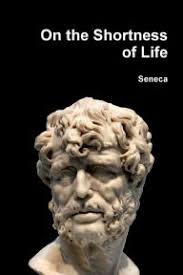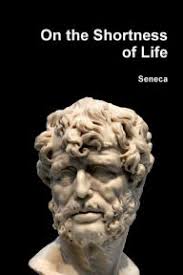“Samayam Goyam Ma Pamay.” Lord Mahavira.
(Meaning: Don’t waste a single moment, Mahavira advised to his senior most disciple Gautama)
In his little book On the Shortness of Life, Seneca (A Roman Philosopher) writes a very powerful message for all of us. This could be quite awakening and life changing read.
“Most human being complaints about the meanness of nature, because we are born for a brief span of life. … life ceases for the rest of us just when we are getting used for it.”
The author warns us. He says.” It is not that we have a short time to live, but we waste a lot of it. Life is long enough and a sufficiently generous amount has been given to us for the highest achievements if it were all well invested.”
Consistently the author reminds us how we waste our short life for wasteful and unimportant activities. These activities are as he writes,” One man is gripped by insatiable greed, another by a laborious dedication to useless tasks. One man is soaked in wine, another sluggish wish idleness. One man is worn out by political ambition, another through hope of profit is driven headlong over all lands and seas by the greed of trading.
Some are tormented by a passion for army life, always intent on inflicting dangers on others or anxious about the danger to themselves. Some are worn out by the self-servitude of thankless attendance of the great. Many are occupied by either pursuing other people’s money or complaining about their own…. Some have no aims at all for their life’s course, but death takes them unawares as they yawn languidly.”
He is concerned about the person’s occupation with one or the other activities for one or the other irrelevant reason. He says it is a small part of life we really live.
He is also warning rich. “How many find their riches a burden? How many are pale from constant pleasures?. People are frugal in guarding their personal property, but as soon as it comes to squandering time they are most wasteful.”
Everyone is after earning money, until the last breath, which will remain here after the death and yet we are not awake and realise this. There must be some other purpose of life. This reminds me of a story of Alexander’s the Great’s last message:
On his death bed, Alexander summoned his generals and told them his three ultimate wishes:
- The best doctors should carry his coffin
- The wealth he has accumulated (money, gold, precious stones) should be scattered along the procession to the cemetery, and
- His hands should be let loose, hanging outside the coffin for all to see.
One of his generals who was surprised by these unusual requests asked Alexander to explain.
Here is what Alexander the Great had to say:
- I want the best doctors to carry my coffin to demonstrate that, in the face of death, even the best doctors in the world have no power to heal.
- I want the road to be covered with my treasure so that everybody sees that material wealth acquired on earth, stays on earth.
- I want my hands to swing in the wind, so that people understand that we come to this world empty handed and we leave this world empty handed after the most precious treasure of all is exhausted, and that is TIME.
TIME is our most precious treasure because it is LIMITED. We can produce more wealth, but we cannot produce more time. When we give someone our time, we actually give a portion of our life that we will never take back. Our time is our life.
This is what Seneca is concerned about and what Lord Mahavira was concerned about when he advised Gautama. Time. We waste a whole life, i.e. TIME to earn money, quarreling, socialising, on entertainment, and in physical pleasures.
“How much have you lost through groundless sorrow, foolish joy, greedy desire, the seductions of society, how little of your own time left to you?”
Our problem is we never realise even we are going to die. “Your own frailty never occurs to you. You don’t notice how much already passed, but squander it as though you had a full and overflowing supply. You act like a mortal in all that you fear and like immortals in all that you desire.”
He laments all those who think some years in a life are guaranteed to them. “When I am fifty I shall retire into leisure when I am sixty I shall give up public duties. And what guarantee do you have a longer life? Who allows you to proceed as you arrange it? Aren’t you ashamed to keep for yourself just the remnants of your life, and to devote to wisdom only that time, which cannot be spent on any business?”
The book has many examples and wisdom to think about the life. Think about our mortality and purpose of life. We literally waste our life for our insatiable desire and greed even after we have a lesson from the great King Alexander.
Seneca writes,” Believe me it is better to understand the balance sheet of one’s own life than a corn trade.” We all are experts in analysing balance sheets of our business and others’ business totally ignorant about our own life’s balance sheet. What a paradox!
In the book Jonathon Livingston Seagull, the Seagull thinks,” “There ‘s got to be more to life than fighting for fish heads.” Seneca and all the other thinkers of substance have also said so. Alexander’s example should make us think about the life, its purpose, its shortness, and how we waste it for everything that will remain here after the death.
In the book, Seneca writes,” The purpose of the life is to pursue philosophy,”
What Indian philosophy of Jainism says is: The purpose of human life is to know the real self, i.e. soul as different from the body and extinguish the Karmas to end cycles of life and death.
This is a short book and even if you read the first part of On the shortness of life, it is worth the time or rather I would say the most important use of the time.
What can be more important than to know about the shortness of time left in our lives and to use that time for the purpose for which we are given this human body?



